On July 11th, 2017, Lorenzo Johnson walked out of Dauphin County Courthouse a free man after over two decades of being behind bars for a crime he didn’t commit.
He had tasted freedom once before, albeit briefly — the Yonkers native, served sixteen-and-a-half years of a life without-parole sentence until 2012, when the Third Circuit Federal Court of Appeals ruled there was legally insufficient evidence for his conviction. He remained free for four months.
In that four-month period, Lorenzo was able to get a taste of what the majority of us take for granted — our freedom. With the help of the Jeffrey Deskovic Foundatio
“The Foundation helped Lorenzo reintegrate, assisting him with emergency funding, taking him shopping, helping him re-orient to technology, ensuring he had regular contact which was a stabilizing factor; and we even found an employer who offered him full time employment, though the day he was scheduled to start it terrible news came down from the US Supreme Court.” Additionally, Jeffrey
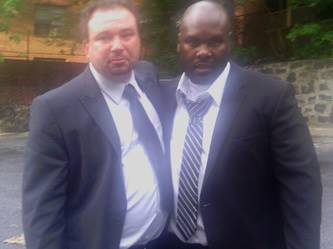
Life for Johnson was finally brimming with hope again.
But then the cruel hand of fate that had lead to him losing much of his adult life dealt him another undeserving card.
Deskovic recounts: “Four months later, the U S Supreme Court granted the PA Attorney General’s office permission to appeal to them while also reinstating his conviction all in one shot- without his attorneys having the chance to fully brief and argue the issues. Rather than going on the run, Lorenzo decided to stay and fight to clear his name. That resulted in my having to drive Lorenzo back to prison to resume a life without parole sentence.”
Deskovic recalls that drive in vivid detail.
“I remember when I got the phone call from Lorenzo saying that the US Supreme Court had not only agreed to hear the Pennsylvania Attorney General’s appeal, but that they’d reinstated his conviction,” Deskovic tells Kindness and Hope. “It was a very surreal moment. I almost couldn’t believe my own ears. Having a conviction reinstated after being released is every exoneree’s nightmare, and being so close to Lorenzo, I reacted very strongly. I remember the feeling of powerlessness. Then, Lorenzo called on me to do one of the most difficult things I’ve ever had to do in my life – drive him back to prison to resume a life without parole sentence for a crime he was innocent of. Though we tried to reach out to the media and politicians to intervene, hoping for a miracle, we couldn’t stop the judge’s order from being issued requiring Lorenzo to turn himself in to be re-imprisoned. I picked him up around 5:30 AM in a parking lot in Yonkers. He came outside, and I could see the disturbed look on his face. We both started crying, even though we were grown men. Neither of us could believe that such an injustice had taken place, or that we were really going to do this: drive him back to prison for a crime he was clearly innocent of. Every ounce of me wanted him to run. But clearing his name was paramount for him, and that path dictated that he not run away. We took turns driving back to the prison in Pennsylvania. Our heads were spinning. At times we made small talk because reality was too painful to keep at the forefront of our minds. At other times we thought about the absurdity of what we were doing. We tried to buoy our spirits by telling each other periodically that this was all only a temporary setback. Despite our own horrible experiences with the criminal justice system, we were both a little naïve. I thought that this would be finished within a few months – that an investigation could be completed quickly and Lorenzo would be back out again soon. I couldn’t imagine that Lorenzo would still be in prison five years later. At the same time, Lorenzo was fielding a lot of phone calls. People were calling him and he had to explain what was going on. In the last hour of the trip, he focused on making, rather than receiving, calls. He was saying his goodbyes to people who were important to him. I think that made the last leg of his difficult journey more difficult, because everybody he talked to said that if it were them, then they would run. We had a final meal on the outside. We were joined by La Tasha Williams, who is an ardent supporter of Lorenzo’s. We did the best we could in a terrible situation. We tried to enjoy the meal. We took photographs. The meal seemed like a weird parallel to the Last Supper.”
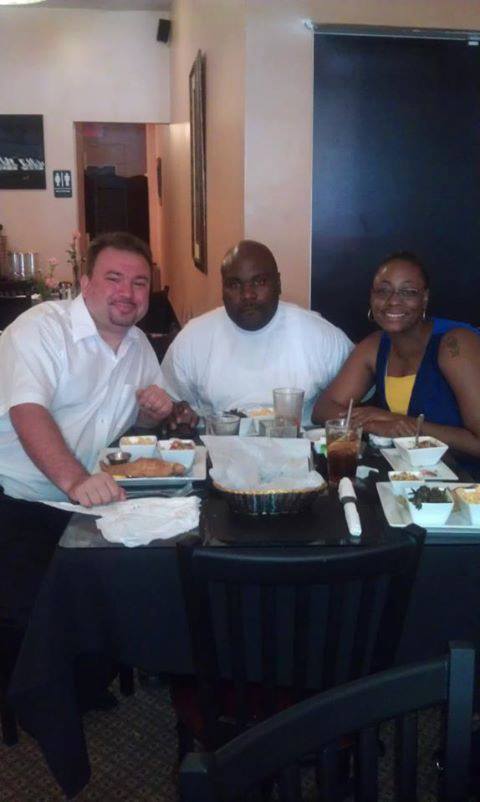
“Lorenzo chose to drive the last five minutes of the trip. I told him he was so much stronger than I could ever be. I couldn’t have done what he was doing. He got out of the car and went over to where the CO‘s were waiting for him. I saw them put him in handcuffs and bring him inside the prison. As I pulled out of the parking lot, It struck me how useless the money I’d given him to orient/set himself up in prison was, such as buying a typewriter, clothing items, hygenic items, food from the commissary, and even funds for making copies of court cases and postage for legal correspondence, in the overall scheme of things. I drove off of the prison grounds without him. I could feel his absence. I had to pull the car over for ten minutes on the public road right in front of the prison in order to get my emotions together enough to be able to drive.”
He adds: “In hindsight, it just seems so clear to me—as clear as the Southern sky—that only an innocent man would have done what Lorenzo did.”
But the fight was far from over.
Deskovic explains: “The Foundation then joined the effort to exonerate Lorenzo, with the Foundation doing a little investigative work but mainly assisting on the public relational and grassroots end, while attorney Michael Wiseman and the Capita
Press coverage can be seen in the clips below:
The Foundation promoted Lorenzo’s articles on social media, and additionally obtained a paid intern who managed his website, sent out email blasts, and related tasks. The Foundation persuaded Lonnie Soury, of Soury Communications, who specializes in public relations work around wrongful convictions (cases that ended in exoneration that he played a p.r. role include: Marty Tankleff; Derrick Hamilton (21 yrs); while also assisting the West Memphis 3 in their effort in regaining their freedom.). Soury assisted in obtaining news coverage in collaboration with The Foundation, organizing rallies, media coverage etc. The Foundation also assisted Lorenzo on a morale level, speaking with him several times a month on the phone, sending him money each month, ordering food packages, visiting him, and connecting him with other people.
When the paid intern could no longer assist with Lorenzo’s website, Thomas Dichter of Decarcerate
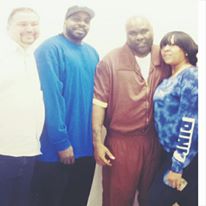
“While Lorenzo expected to be back in prison for 3 or 4 months pending the investigation to turn up new evidence which he could then base a new effort to get his wrongful conviction overturned again, he actually ended up remaining incarcerated for 5 years,” Deskovic says. “Simultaneous to the investigation going on, Wiseman filed several challenges to Lorenzo’s conviction on other legal grounds, losing several legal proceedings despite having very compelling legal grounds. Ultimately the investigation was completed and an evidentiary hearing was finally scheduled- after Lorenzo waited for a year and a half to get to a hearing on this new evidence. The grounds that were going to be litigated included Brady violations (favorable evidence to him had not been turned over). Specifically, that the PA Attorney General’s Office had not disclosed evidence favorable to the defense that: Carla Brown [the sole eyewitness] had been an alternative suspect; that the motive witness Victoria Daubs had a familial relationship with the main detective, mother; and that nearly 200 pages had been withheld from the defense that were supposed to have been turned over.
“On July 10, 2017 the night before the evidentiary hearing on July 11th, the PA Attorney General’s office offered Lorenzo a deal in which if he plead guilty via a nolo contender plea to 3rd degree murder he would be released immediately, and be placed on the least restrictive form of parole while not needing permission to travel. A nolo contender plea is a type of guilty plea in which the defendant says that he/she is innocent but believes that they may be convicted/may lose the legal proceeding and so they are pleading in a type of damage control pragmatic decision.”
Deskovic adds: “This is where the unfair, dirty, and disgusting tactics of the Pennsylvanian Attorney General’s office came in: The AG’s office argued that the judge might take anywhere from a few weeks to 6 months to make a decision; they were threatening to appeal the decision a couple of times if they lost- which might have either taken months or possibly up to 2 years- and they were threatening that if they lost the appeals they were going to retry him. Although an acquittal would become almost certain at a trial, that too would result in him likely remaining incarcerated pending the trial. So all together, he might have been in prison anywhere from 3-6 months more to up to two or more years. The dirtiness of the tactic is that they were only offering this deal because they knew they were likely to lose the hearing. The appeals would not have been in good faith;and they knew the case was no longer winnable for them at a trial. Yet they were willing to drag things out, trying to get as much time out of him as possible, all in an effort to get him to plead guilty.“
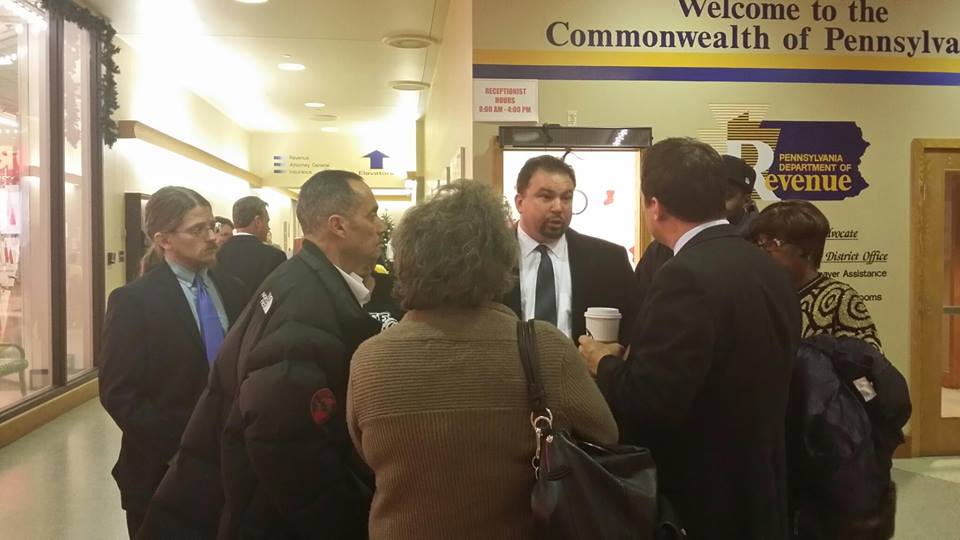
“Lorenzo felt pressure to take the deal. He felt that it had already been 22 years, and who knew long the case would continue to drag out? He was worried about being wronged by the court system again after having had that happen twice before (being wrongfully convicted and that taking 16 ½ years to straighten out, and then having the wrongful conviction being reinstated). He was concerned with his elderly mother, who was 81 years old.“
“I was and still am opposed to the deal, wanting him to continue fighting so that he could clear his name and be free as an exonerated man. This way he would not suffer any of the collateral after-effects, such as having a criminal record; not being able to vote; not having the added difficulty in getting a job and renting an apartment. I also wanted him to be compensated. The other entities: attorney Michael Wiseman and the Pennsylvania Innocence Project urged him to take the deal. Though he almost certainly would have won the hearing, there was a slight chance he could lose, and that would mean possibly remaining in prison forever unless he won a future hearing. He took the deal and was released that afternoon.”
Johnson, for his part, isn’t as bitter as you might expect.
We asked him: How do you make up for 22 years of having your life taken away from you?
He was matter-of-fact in his answer.
“There are two things in life that can’t be replaced, and those are life and time,” he says. “There’s no way to make up for 22 years of stolen life. There’s only living from here.”
As for the plea deal, which he was forced to take so he could finally get on with this living business, he said: “It is a sad day and time for our criminal justice system. An innocent prisoner shouldn’t have to serve one second in prison, let alone have to enter a plea bargain to regain their freedom.”
He explained that during that during that second prison stint it was the knowledge that he was innocent that gave him an inner strength and the belief that justice would eventually prevail.
“Innocent prisoners have a fire within them to be vindicated of the crime they’re falsely convicted of,” he says. “That, coupled with the support of my family, friends, and supporters, gave me the energy I needed to head back and go fight for a second time to prove my innocence. Driving back to prison was the biggest and hardest decision I made in my life.”
Since his release Johnston returned to his hometown of Yonkers, NY, rejoined his family, and has become a vocal advocate for fighting for those who are wrongfully convicted.
“I plan to continue to educate society on wrongful convictions and lobby for stricter rules for prosecutorial misconduct,” he says. “I’m a speaker and a fighter because I have a story to tell, the story that all wrongfully convicted people share, which is that we are innocent. I also plan to enjoy the rest of my life.”
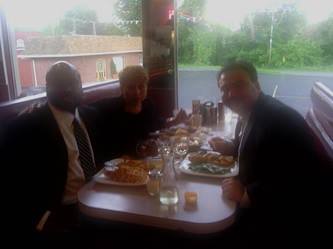
Johnson’s voice really resonates in his writing, giving people a better insight into how a wrongful conviction shatters the life of not only the accused, but everyone around them.
In an op-ed piece for the Huffington Post, he wrote:
Often, when someone is exonerated for a crime they never committed, society only sees the individual case of injustice and misses the overall nightmare of wrongful convictions. Then again, record-breaking number of exonerations in the past two years shows how common wrongful convictions have become. It’s sad but true: with nearly 2086 people exonerated since 1989, injustice has become ordinary and accepted.
Wrongful convictions are like large bodies of water — with deadly undercurrents. We all know what happens when something is caught in an undercurrent. It’s displaced, lost, and sometimes never seen again. As innocent prisoners, our lives, family, friends and faith in the criminal justice system all get caught up in the undertow.
When an innocent person is falsely charged, convicted, and sentenced to prison for being innocent, it does not only affect us as individuals — it tears our family threads apart. Sometimes it destroys our support systems altogether, leaving us completely alone to fend for ourselves.
For those of us who have family support, a part of our family dies every time one of our appeals is denied. Why? This fuels their fears of never seeing us physically free again. Our families are torn apart, with kids growing up without their mothers and fathers. There are two things in this world that we can never get back if lost: life and time.
There’s more to it than being locked in a cage for something we didn’t do. In prison you encounter and share space with people who are in for everything from petty theft to multiple homicides. Are all of them terrible people? Not at all, but there are many you wouldn’t want in a mile radius of your family. Then you have prison staff, who view us as just another guilty prisoner. This is our living environment.
On a recent visit with one of my daughters, the topic came up of how long I’ve been in prison. My daughter was born while I was in the county prison, facing charges. It’s 21 years later, now. Her whole life, her dad has been in prison serving a life sentence for being innocent. Nobody other than me will sit her down and try to explain why and how this happened.
I’m one of many faces of wrongful conviction. I’m a writer, so I constantly speak out about our pain. Unfortunately, revealing our injustices has repercussions seen and unseen. My appeal has been continuously “slow walked” because of this. The people responsible for our suffering would rather that we be quiet about what they’ve done and continue to do to us. But I refuse to wear a muzzle and stop educating society about what goes on every day in our courtrooms.
I don’t write for pity or sympathy. I write to inspire society to take a stand with us and combat injustice as a whole. We lack the resources and numbers that you can bring to the table. Please hear the cries of the innocent.
For Johnson, the Jeffrey Deskovic Foundation For Justice was instrumental in changing his life and gaining his freedom, with Deskovic having heard the cries of the innocent (Deskovic, himself was wrongfully convicted for 16 years. Read his story HERE)
“Besides Jeffrey Deskovic being a great friend of mine, The Jeffrey Deskovic Foundation played an intricate part by helping keep my innocence in the public’s eye by publicizing my innocence, holding rallies on my behalf, and funding the rallies and bus rides from New York to Pennsylvania for my family and supporters to come to my hearing,” Johnson says.
As to what Kindness and Hope means to Johnson who has suffered so much for no apparent or just reason?
“I’ve always been a kind person and I relied on hope, not once but twice, to regain my freedom,” he says. “I’m a firm believer in kindness and hope.”
According to the National Registry of Exonerations, there have been 2086 exonerations to date. To give others who were wrongfully convicted hope, please donate to The Jeffrey Deskovic Founda
The Jeffrey Deskovic Foundation For Justice is a New York based 501(c)(3) committed to exonerating the wrongfully convicted both in DNA and Non-DNA cases, as well as seeking changes in the law designed to prevent wrongful conviction in the first place. To pave the way for such changes, The Foundation regularly raises awareness about the issue and sometimes meets with elected officials and testifies at hearings where legislation is considered. Learn more HERE.



